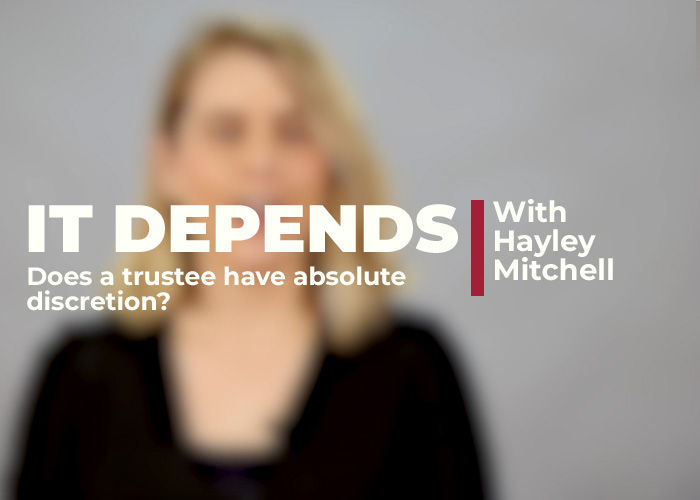In this edition of ‘It depends’, partner Hayley Mitchell talks about whether a trustee has absolute discretion. Hayley and associate Sarah Camm will be covering this topic in a webinar later this month.
Video transcript
Hi and welcome to another edition of It Depends. Today I’m going to be talking about whether a trustee has absolute discretion.
What is the trustee’s role?
The trustee’s role and the way that it can exercise its power will depend on a variety of factors, including the terms of the trust deed itself. Are we dealing with a family discretionary trust or a self-managed super fund or a unit trust, for example? The nature and purpose of the trust, who is included as a beneficiary of the trust, and what are the considerations that the trustee needs to take into account or think about when it’s making its decision? Typically, for a discretionary trust or what we commonly refer to as family trusts, the trust deed itself will actually state that the trustee has absolute discretion when the trustee is making its decisions.
What does absolute discretion mean?
Absolute discretion means that the trustee can freely and voluntarily make a wide range of decisions without the influence or direction of the beneficiaries of the trust. The types of discretionary decisions a trustee will make are things like whether it varies or updates the terms of the trust via the trust deed, the investment strategy, or the assets of the trust buying and selling the assets and generally dealing with those assets, and then the all important decision that most beneficiaries are concerned about are the distributions of income and capital from the trust. However, absolute discretion doesn’t mean that the trustee can do whatever they like. The exercise of the absolute discretion has to be done in a way where the trustee is taking into account its role and responsibility as a fiduciary.
What must the trustee do to properly exercise its discretion?
Any discretionary decision must be exercised with good faith and with proper consideration for the purpose of the trust. To do this, the trustee must make sure that they can demonstrate that they are aware of their role and their responsibility as a trustee, who the beneficiaries of the trust are, that they understand the terms of the trust and the trust deed, and that the trustee has enough information about the beneficiaries to properly consider them and whether or not they receive a distribution from the trust. If any of these factors are not present, the trustee is at risk of their decision being exercised in bad faith and without proper purpose. The consequence of this is that the trustee’s decision can be potentially overridden by the courts and the trustee themselves removed from that position. This is potentially a risk where the trustee is a family member and they have a conflict or a bad relationship with one of the other beneficiaries of the trust. The court cases really demonstrate that where this conflict or relationship is so bad, the trustee may never be in a position to properly exercise their discretion. So, there’s a real risk of removal in those cases.
Does the trustee have absolute discretion?
In most cases, yes. But whether the trustee’s exercise of discretion is valid will depend on the process that the trustee took to exercise that decision.
Sarah Camm and I will be covering this topic in our webinar later in August. So, register now to hear more about trustees exercising their discretion.





